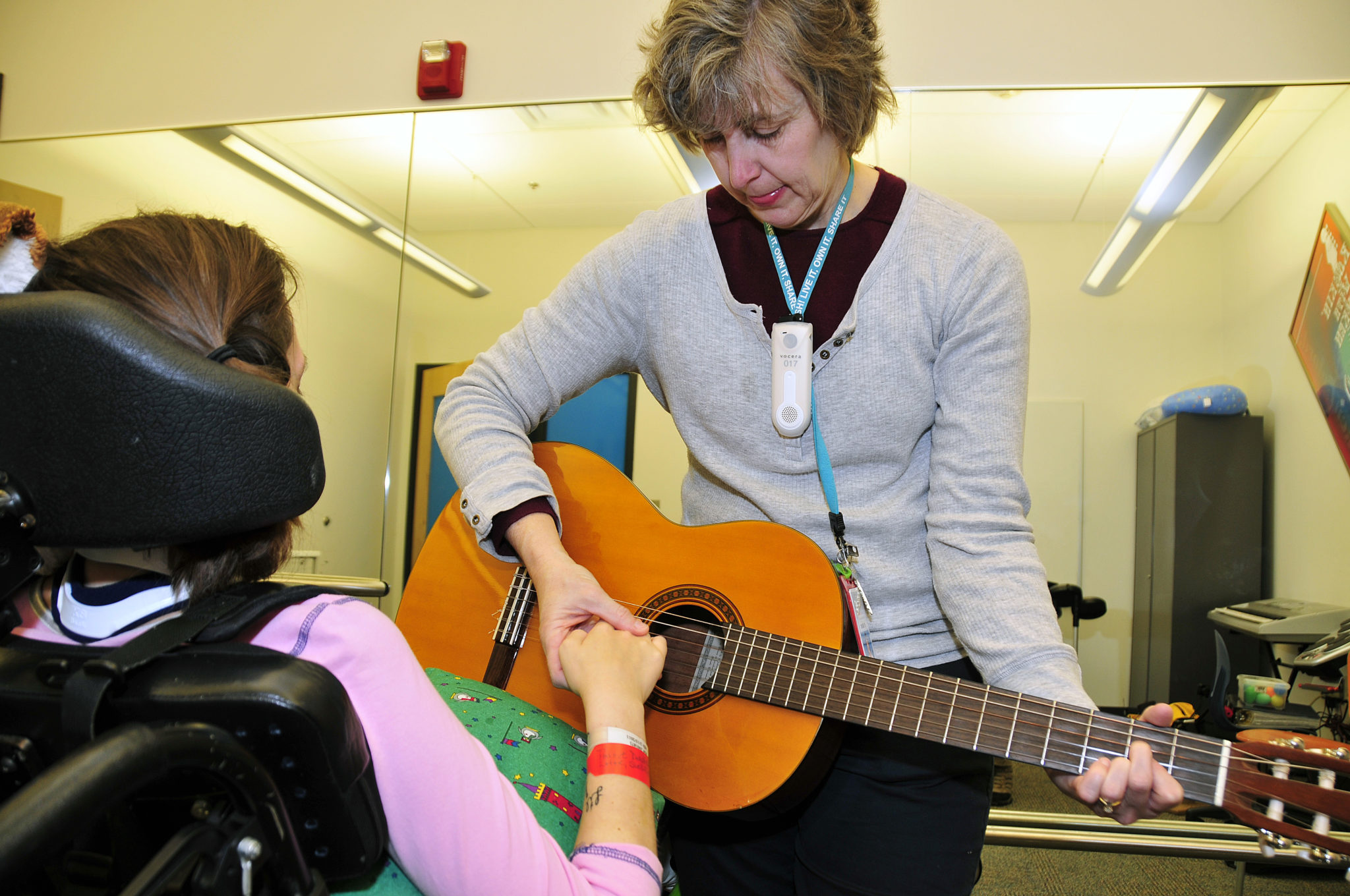Music Therapy
What is music therapy?

“Everything we do in Music Therapy at Ranken Jordan is purposeful. It’s rewarding to see the improvements in patients through Music Therapy.”
— Mary Hitchcock-Reinhart, MT-BC
Who can participate in music therapy at Ranken Jordan?
At Ranken Jordan, children of all abilities are able to participate in and benefit from Music Therapy. This includes children who are on ventilators or have other health challenges. Our Music Therapist adapts music to age and developmental levels and physical abilities as well as musical interests so Music Therapy can benefit all children.
Music Therapy uses techniques that aim to stimulate brain function controlling movement, cognition, speech, emotions and the senses. At Ranken Jordan, Music Therapy may include creating, singing, moving to music and/or listening to music. It also often involves playing a musical instrument, even if a child has no formal training. We go the extra mile to ensure every child can enjoy Music Therapy safely and receive the maximum benefit from it.
Patients participate in Music Therapy as a group or in individual sessions depending on their needs. Group sessions include toddler music and movement, sensory/relaxation for various ages, and social/leisure. Music therapy has a dedicated room at the hospital, which gives children another opportunity to get out of their rooms and experience other parts of the building.
How does music therapy benefit children and adolescents?
Music engages the whole brain. Because most children and adolescents enjoy music, Music Therapy tends to hold their interest and actively engage them for positive results.
Our Music Therapist is Board Certified (MT-BC), is fellowship trained in Neurologic Music Therapy, and has extensive experience in Music Therapy. Music Therapy complements other therapies to help children reach rehabilitation goals, coping goals, and developmental goals. Our Music Therapist’s expertise in Neurologic Music Therapy is at the heart of each session as she partners with Physical, Occupational and Speech Therapy teams as well as Recreational Therapists, Child Life Specialists and OZ staff.
Examples of Music Therapy goals and how Music Therapy partners with other therapies:
Cognitive – increasing attention span, following directions, increasing memory and recall, patterns – attending to, recognizing, and imitating; understanding cause and effect, making choices, enhancing learning about a specific topic, building vocabulary, playing peek-a-boo, increasing creativity, increasing reading skills
Sensory – responding to auditory stimulus, responding to tactile stimulus, tracking objects using sight and sound
Fine Motor – reaching for objects, grasping, bringing objects together at midline, transferring of objects from one hand to another, clapping
Gross Motor – increasing movement and range of motion with upper and lower extremities, encouraging movement of and correct position of head, developing an internal steady beat, providing steady beat for gait training, motivator for position changes and weight bearing
Speech/Language – imitating sounds, improving articulation, increasing breath control and strength, learning facial expressions, tolerating speaking valve, increasing use of augmentative communication device, regaining ability to speak
Social/Emotional – leisure skill building, enabling a smooth transition from hospital to home, allowing for a more pleasant hospital environment, increasing self-esteem, creating a sense of independence, expressing emotions, preparing for surgery or procedure, making eye contact, displaying appropriate social skills, using socially appropriate language, taking turns, experiencing a sense of trust with adults
Distraction – during: procedures, activities of daily living, physical therapy, passive range of motion, illness, pain, positions and position changes
Breakthroughs in progress reinforce the value of music therapy at Ranken Jordan.
Music therapy success story from our Music Therapist
“*Joe* was a teen with a severe brain injury who was at Ranken Jordan for many months. He wasn’t able to move or respond much when he first arrived. After a few months in music therapy, he could follow one-step physical directions. When a group of patients from Ranken Jordan went caroling, this teen came along and kicked the drum at the appropriate time for the ‘12 Days of Christmas’ song. Soon, he began vocalizing, then progressed to singing. One song we worked on was ‘No Shoes, No Shirt, No Problem’ by Kenny Chesney. By the time he went home, he was singing the whole song. About three years later, the teen was visiting Ranken Jordan with his mom. I didn’t recognize him at first but he yelled to me “Hey, no shoes, no shirt, no problem!” Knowing he remembered and seeing progress like that makes it all worthwhile.”
“I still think about how Ranken Jordan changed my life.”
— Kiland Sampa, Inpatient Jul-Nov 2013, Outpatient Dec 2013-Dec 2014
